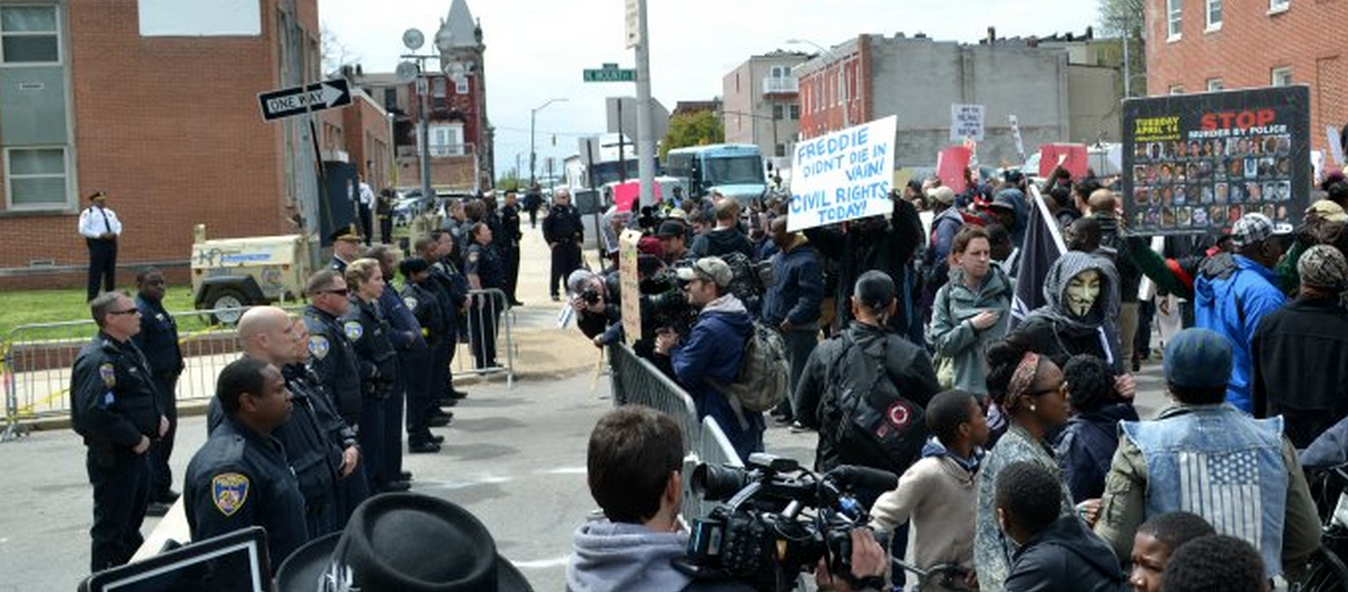
Corporate Lessons Learned From Global Uprisings
What do social justice protests have to do with leadership development? Blogger Monica Hawkins shares four lessons corporate executives should learn from the unrest in global communities.
June 1, 2015
Demonstrators in Baltimore protest against police brutality, sparked by the death of Freddie Gray. It was one of many cases of unrest in the last month. (Photo courtesy of Wikimedia Commons)
The month of May 2015 was chalked full of protests:
May 1, 2015, the city of Baltimore was stunned when State’s Attorney Marilyn Mosby, charged six police officers in the death of 25-year-old Freddie Gray, who died one week after being taken into police custody.
On the newly formed “2015 May Day protests” Wikipedia page, there is a list of worldwide protests in Italy, Maldives, London, Seattle, South Korea, Turkey and other places over austerity measures and poor working conditions. Thousands of Ethiopian Jewish protesters have taken to the streets of Tel Aviv with accusations of racism and demands for social justice after two police offices beat a black Israeli soldier.In Cleveland a few weeks ago, there were protests in the streets after the acquittal of patrolman Michael Brelo, who shot and killed an unarmed couple. In Macedonia this month there have been protests by tens of thousands on misuse of government authority, growing privacy concerns and police brutality.
Many people would agree that these are societal issues with which the government must deal. However, there are corporate implications. Are corporate leaders paying attention to what’s happening in the communities of the people with whom they work? Is there corporate social responsibility to aid in the solution of growing issues that could ultimately affect stockholder returns? Could we perhaps be intentional about tying this to learning activities?
Indra Nooyi, CEO of PepsiCo, delivered a speech to the Economic Club of Washington, D.C., on May 12, 2009, entitled, “Leading to the Future.” In her speech, Nooyi asserts, “The company of the future has to be guided by the fact that it owes an obligation back to society.” She goes on to compare the dominant model of organizations today with those of times past. Companies of today strive to deliver more shareholder value. They work hard to maximize the return on capital and stock markets, leading to them being seen as “a source of value but with limited guidance by values.”
Contrast that with companies from the 19th century that were viewed by many to be community organizations, “rooted in the society which gave them a home.” They not only provided occupations for their employees but also often housing and other benefits as well. Over time, this form has declined. Companies went from local to national to regional and then global. With the fierce competition of the free market, companies, in their focus on returning a surplus could no long afford to be so generous.
Civil unrest is knocking at many doors. There are issues of wage disparity, work schedule disputes and quality-of-life issues that are on the radars of global leaders as they work to advance their companies to new heights. The question is: Are we paying attention to what is happening?
Below are some lessons that corporate leaders can learn from the communities in which we live:
Get great at operations. Great leaders know their company thoroughly. They understand the books and what they have to do to make their numbers. They understand what decisions influence the rest of the organization.
Communicate the vision. Help everyone understand what he or she is working toward. Not only should the leadership be capable of expressing the mission of the company, but also each individual should know how to tie this mission to their every day work and to something bigger than themselves.
Be data-driven. Understand data needed to improve the corporate bottom line but also the data that affects your workforce. When you work to understand the social lens that your employees come to work with, new solutions may emerge.
Consider the collective corporate legacy. Do you want to be the type of organization that delivers shareholder value without counting the cost of the impact to employees? Tough-guy leaders who deliver return on capital despite the emotional or social cost is not someone who can lead tomorrow’s employees.
Global leaders today are being influenced by factors that seemingly have nothing to do with their business bottom line and many times without their knowledge. Despite being good people who work hard, focus on upholding solid corporate culture and delivering great value to shareholders, there is a dynamic brewing outside our corporate walls that is ripe for opportunity for engagement. From many of the uprisings that are happening across the world, the emerging themes are resoundingly similar. There are cries from protestors to be heard and to once again feel relevant.
Monica P. Hawkins is CEO of PPDG and is an adviser to Fortune 1000 C-suite executives across the globe, focusing on alignment of business objectives with talent management systems and learning agendas. She can be reached at editor@CLOmedia.com.

